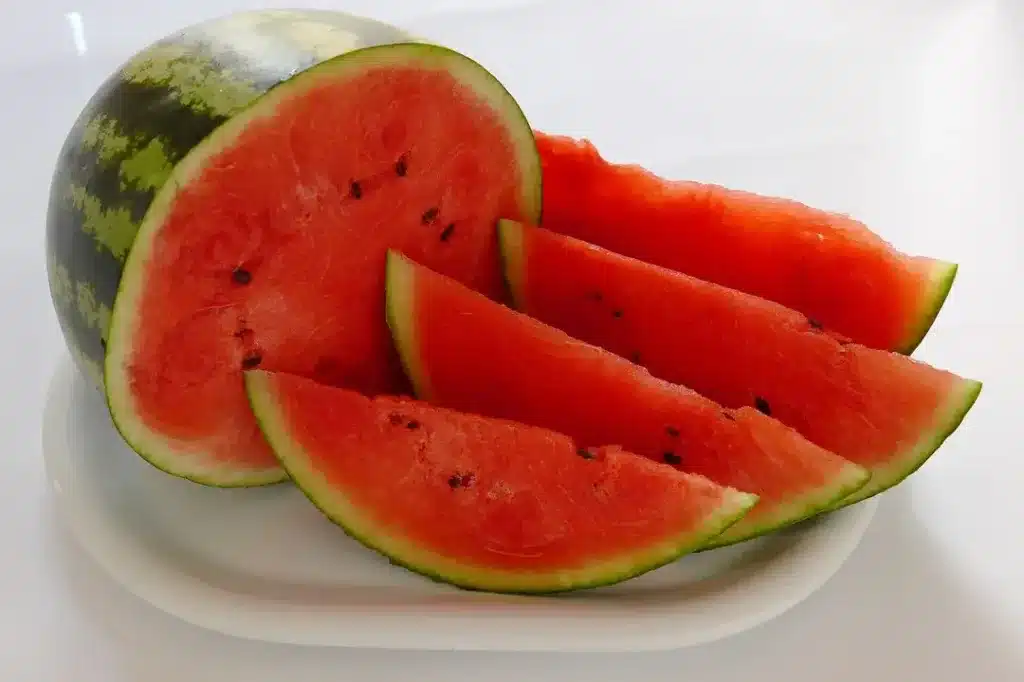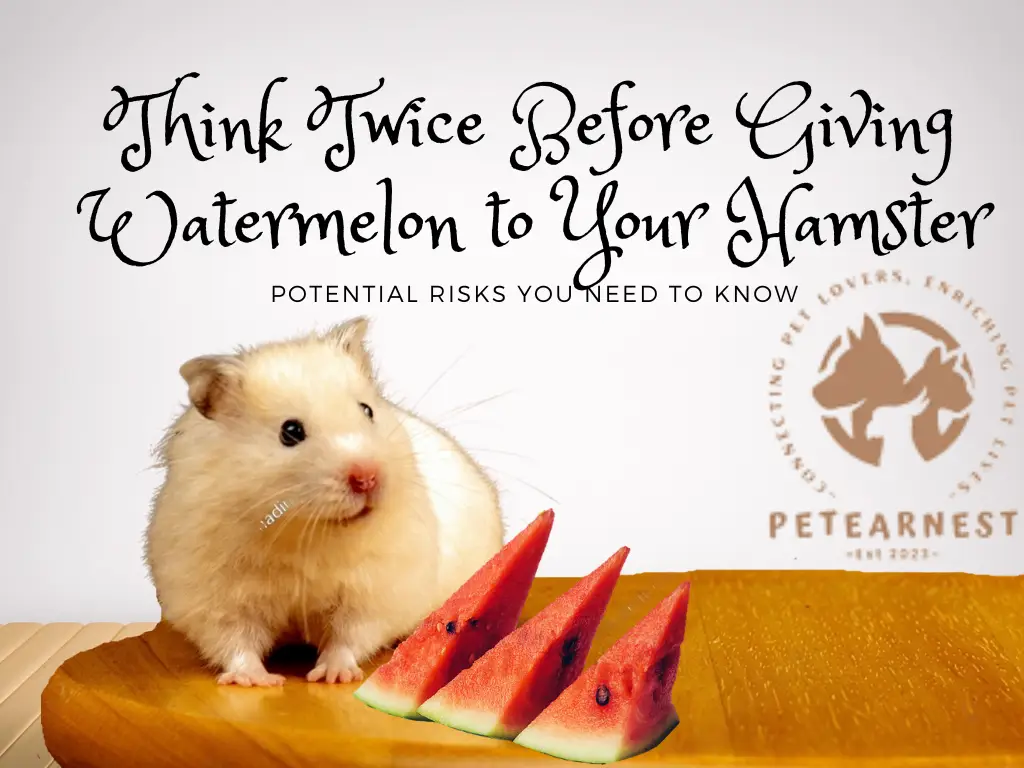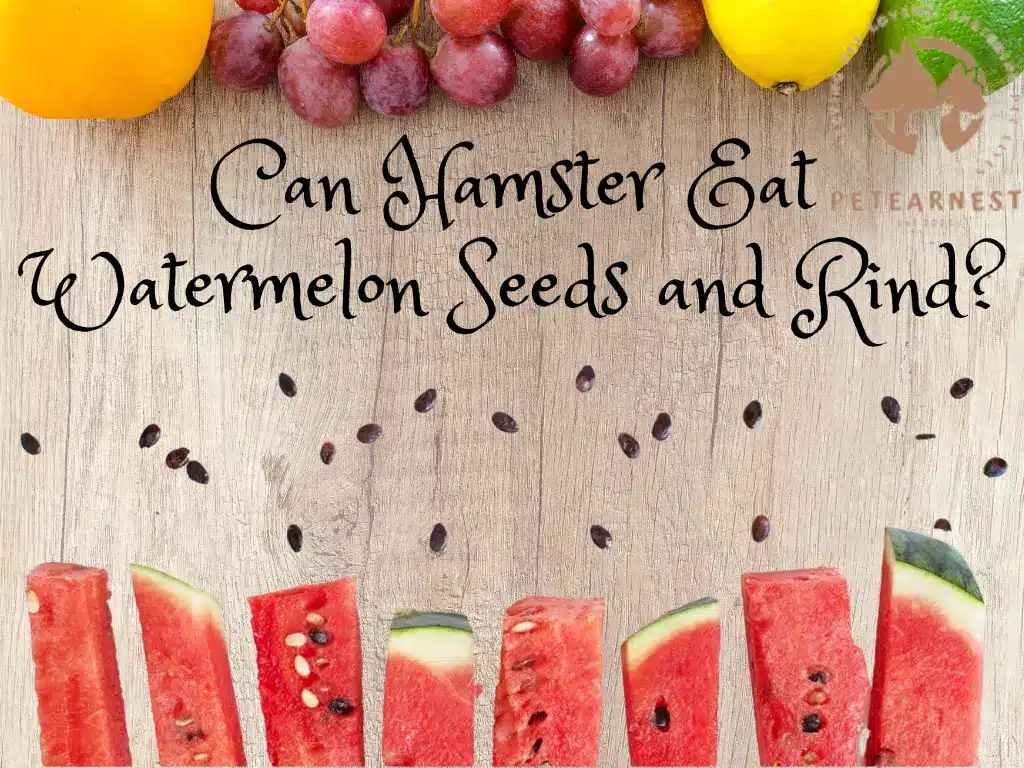Hamsters are adorable, furry pets that require a balanced diet to stay healthy and happy. As a pet owner, it’s important to ensure that your hamster receives a nutritious and varied diet. While hamsters can eat a wide range of fruits and vegetables, some may not be safe or suitable for them to consume. In this article, we’ll answer the question, “Can hamsters eat watermelon?” and provide you with a complete guide to feeding your furry friend.
Can Hamsters Eat Watermelon?
Yes, hamsters can eat watermelon. In fact, watermelon is a healthy and hydrating treat that provides many nutritional benefits. Watermelon is low in calories, high in water content, and rich in vitamins and minerals. However, it’s important to feed your hamster watermelon in moderation and take certain precautions to ensure their safety.
Here are some tips on how to safely incorporate watermelon into your hamster’s diet
- Introduce watermelon gradually: If you’re feeding your hamster watermelon for the first time, start with a small piece and observe their reaction. Hamsters have sensitive digestive systems, and sudden changes in diet can cause stomach upset.
- Remove seeds and rind: Hamsters can eat watermelon flesh but should not consume the seeds or rind. These parts of the fruit can cause digestive problems and should be removed before feeding your hamster.
- Cut the watermelon into small pieces: Hamsters have small mouths, so it’s important to cut the watermelon into bite-sized pieces. This will make it easier for your hamster to eat and digest the fruit.
- Don’t overfeed: While watermelon is a healthy treat, it should be given in moderation. Too much watermelon can cause diarrhea and other digestive problems in hamsters.
Nutritional Benefits of Watermelon for Hamsters

Watermelon is a rich source of vitamins and minerals that are essential for your hamster’s health. Here are some of the nutritional benefits of feeding your hamster watermelon:
- Hydration: Hamsters need to stay hydrated, and watermelon is a great way to provide them with extra water. Watermelon is 92% water, which can help prevent dehydration and keep your hamster healthy.
- Vitamin C: Watermelon is a good source of vitamin C, which is important for the immune system and overall health. Vitamin C also helps hamsters absorb iron, which is necessary for healthy blood.
- Vitamin A: Watermelon contains vitamin A, which is essential for eye health and can help prevent eye problems in hamsters.
- Potassium: Watermelon is a good source of potassium, which is important for maintaining healthy blood pressure and nerve function.
- Low in calories: Watermelon is a low-calorie treat that can help prevent obesity in hamsters. Obesity can lead to health problems such as diabetes and heart disease.
Think Twice Before Giving Watermelon to Your Hamster: Potential Risks You Need to Know

While watermelon may seem like a healthy snack for your hamster, it’s important to be aware of the potential risks. Feeding your furry friend too much watermelon can lead to obesity, diabetes, and even dehydration. And if you’re not careful, large pieces of watermelon can become a choking hazard. To keep your hamster safe and healthy, it’s important to feed them watermelon in moderation and cut it into small, bite-sized pieces. So, before you offer your pet this juicy treat, make sure you know the risks involved.
FAQs
Q. Can hamsters eat watermelon seeds?
A. It really depends on the breed. While Syrian hamsters can usually handle the seeds without issue, smaller breeds like Dwarf and Roborovski hamsters may be at risk of choking. To keep your furry friend safe, it’s best to avoid giving them the seeds and stick to the flesh of the fruit instead.
Q. Can hamsters eat watermelon rind?
A. Did you know that while hamsters love the juicy, sweet flesh of the watermelon, they may not be so keen on the rind? That’s because the rind contains an amino acid called citrulline, which can give it a sharp, unpleasant taste. So, while it’s safe to feed your furry friend watermelon, be mindful of their taste preferences and stick to serving them the delicious, fleshly part of the fruit.

Q. How often should I feed my hamster watermelon?
A. If you’re wondering how often you should feed your hamster watermelon, the answer is in moderation. While hamsters can eat watermelon, it should be given as an occasional treat rather than a regular part of their diet. As we mentioned earlier, watermelon contains a lot of sugar and water, which can lead to health issues like obesity and dehydration if overfed. So, limit your hamster’s watermelon intake to a few small pieces per week. And remember to always remove the seeds and rind before serving, especially for smaller breeds of hamsters like Dwarfs and Robos. By following these guidelines, you can safely incorporate watermelon into your hamster’s diet and keep them healthy and happy.
Q. What other fruits can I feed my hamster?
A. As a hamster owner, you want to ensure that your furry friend stays healthy and happy. While watermelon can be a great treat, it’s always good to have some alternatives on hand. Here are some tasty options that you can offer your hamster in moderation:
Alternative Treats for Hamsters:
- Celery: This crunchy veggie is low in calories and high in fiber, making it a great occasional treat for your hamster.
- Red lettuce: Red lettuce is a good source of vitamins A and C, which can help support your hamster’s immune system.
- Cucumber: Cucumber is a hydrating snack that can also provide some vitamins and minerals to your hamster’s diet.
- Green beans: These can be given to your hamster either raw or cooked. Green beans are a good source of protein, fiber, and vitamins.
- Basil: This herb is not only delicious but also has some antioxidant and anti-inflammatory properties that can benefit your hamster’s health.
- Summer or winter squash: These veggies are a good source of vitamins A and C, and can also provide some fiber to your hamster’s diet.
- Baby corn: Baby corn is a low-calorie snack that can provide some fiber and vitamins to your hamster.
- Mint: This herb can provide some digestive benefits to your hamster and also adds a refreshing taste to their diet.
- Beets: Beets are a good source of folate, which can support your hamster’s immune system.
- Okra: Okra is a good source of vitamin C and can also provide some fiber to your hamster’s diet.
- Broccoli: Broccoli is packed with vitamins and minerals that can benefit your hamster’s overall health.
- Carrots: Carrots are a great source of beta-carotene, which can support your hamster’s eye health.
Offering your hamster a variety of treats can help keep them engaged and happy. Remember to introduce new foods gradually to avoid any digestive issues, and always research to ensure that any new food is safe for your pet. With a selection of tasty options, you can keep your hamster healthy and satisfied for years to come!
Conclusion
In conclusion, hamsters can eat watermelon in moderation as a healthy and hydrating treat. Watermelon provides many nutritional benefits, including vitamins, minerals, and water content. However, it’s important to follow certain precautions to ensure your hamster’s safety and health. In this article, we’ve discussed the benefits of watermelon for hamsters, potential risks to be aware of, and answered some common questions about feeding watermelon to your pet. By understanding the do’s and don’ts of feeding watermelon, you can safely treat your hamster to this delicious fruit. So, can hamsters eat watermelon? Absolutely! Just be sure to do it the right way.
If you have any further questions or would like to share your own experiences feeding watermelon to your hamster, please feel free to leave a comment below. And don’t forget to check out our other articles on hamster care and nutrition for more helpful tips and information. Thank you for reading!
Can Guinea Pigs Kill Each Other? Protect Your Beloved Pets with These 5 Essential Safety Tips



1 comment
[…] fruits and vegetables: Fresh fruits and vegetables can be an excellent addition to your hamster’s diet, providing them with important vitamins, […]